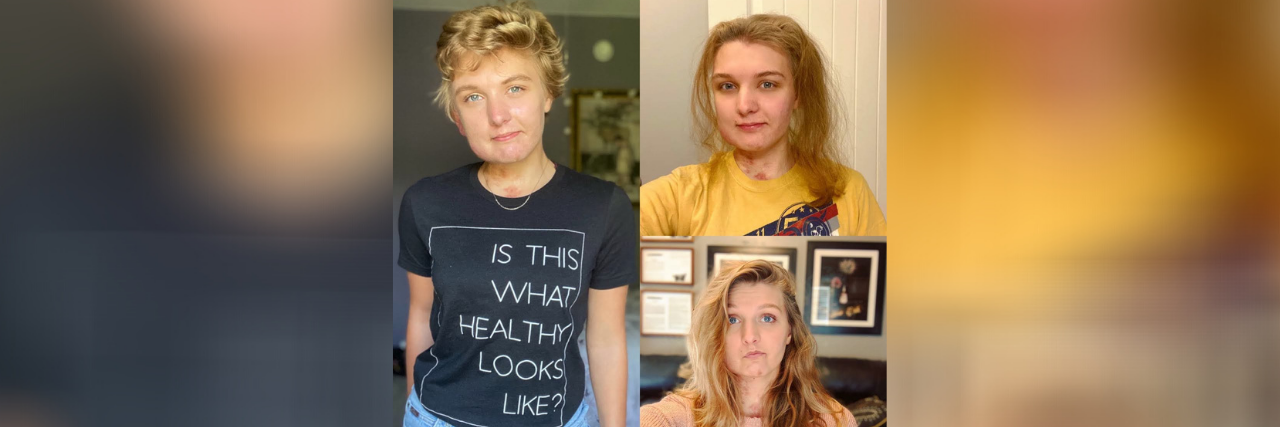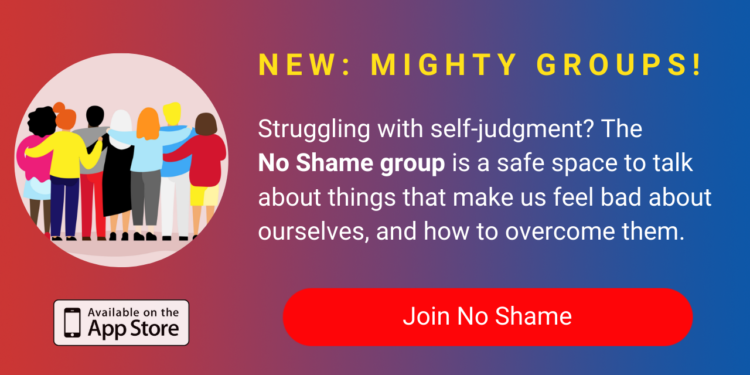“Hair is everything.”
I binged the entire show Fleabag on Amazon Prime in two days and that quote is what stuck out to me in the entire series. I’ve been trying to write about hair for a while now, but I couldn’t develop the words; Fleabag nailed it on the first try.
Losing your hair physically changes your appearance, and if you’ve watched as many America’s Next Top Model make over episodes as I have, you know people are emotionally attached to their hair. There’s always at least one person who is sobbing in the corner threatening to quit the show. I always thought they were so dramatic. It’s hair. It grows back! I would never act the way they were if Tyra gave me a chance. But then I started losing my hair, and suddenly all those emotions made sense.
I knew I was losing my hair three months into chemotherapy for my rare disease. I was diagnosed with arteriovenous malformations (AVMs), a rare and incurable condition where my arteries and veins don’t connect properly. There’s no cure for this, so it’s either invasive surgeries that may not work or experimental chemotherapy drugs that still might not work. I wasn’t sure if I was losing my hair at first because my hair is naturally thin in some areas as a result of my disease. The tricky thing about it all is that it doesn’t just happen overnight either. The before and after is significant, but the day to day isn’t. Just a little bit here and there. Maybe a little more in the shower drain than usual, but I couldn’t spot the difference on my head. I cut my hair shorter to try and combat what could look like hair thinning just to play it safe. I easily played it off as a fun trendy new spring look for myself. Sure, my hairbrush had a little more than normal for me. Sure, if I ran my fingers through my hair, strands would just keep coming. I adapted to it though. I mean, I couldn’t definitively prove that I was losing my hair.
Then I looked at photos and saw where there were gaps. I started removing hair balls the size of small animals from the shower drain. By the time I really accepted it, three quarters of the hair on my head was already gone. I could no longer wear it down. It was patchy, the ends were dried out, and it just hung there, so I wore my hair up every day. I wore headbands to make it seem like a fashion choice I just decided to casually try out. Two months later, I accepted my fate and chopped it all off.
I guess it’s a side effect of living.
I’m losing my hair, but at least I’m alive. Still, I didn’t consent to losing my hair. Yes, I knew it was a possibility, but maybe I’m still in that teenager mentality of “oh, it won’t happen to me.” I also didn’t think I’d have so many feelings about it because I knew it might happen. I was mentally prepared. It wasn’t sprung on me the day of like it is to those models. I had agreed to the terms. I knew what I was signing myself up for when I said I would start chemotherapy and saw the two page long list of possible side effects. So why was I so upset about something I knew would most likely happen?
I’ve narrowed it down to fear.
Hair is important. Why else would there be so many organizations set up to give free wigs to cancer patients. Hair matters. It represents your identity, your style. For me it’s a coping mechanism, a way to hide my AVMs. Losing it, is losing that shield. The most vulnerable part of me, laid bare for all to see. It’s being put into a fight, with the opponent already knowing your weaknesses.
Hair shouldn’t matter because yeah, it’ll grow back eventually. But it does matter. It means I have to learn a new way of styling it. I have to adapt to this new identity. I wake up to find out if this day will be good or bad all because I might’ve slept on it wrong. I may like my new Tyra Banks approved look, but that doesn’t mean I wanted to go through the process. What is our obsession with hair anyway, why does it mean so much, how do we as a society move past this and see we are more than our hair?
Putting it simply, losing your hair stinks. It completely changes you. As if being on chemo isn’t something people already struggle to relate to, now it’s losing hair. Even with feeling confidence in my new pixie cut, I notice myself always answering one question differently…
Why did you decide to cut your hair?
Clearly, I know the answer. I was losing more hair than I was growing new. It looked horrible and unhealthy so I needed to chop it off. Depending on who is asking though I have two answers: “the medicine I’m on caused it to start thinning, so I cut it all off,” or “I realized I was wearing it up all the time and figured why not might as well cut it all off.”
The first one is honest, but it annoys me because for some reason I still can’t say the words chemotherapy to people. The second one may have been a contributing factor, but was not the reason I decided to cut it. If I could’ve still gotten away with wearing my hair down I would not have chopped it. I don’t know if it’s the stigma of losing your hair, if I feel it makes me weak, if I’m afraid of the pity I’ll receive or maybe I’ll make someone uncomfortable, yet for some reason I can’t be 100 percent honest about it.
I don’t regret chopping my hair off, but I do still sometimes get insecure about it. My disease is all out for the world to see and most days, that doesn’t matter. Most days, I forget about them and continue to live my life. Most days, I am happy.
But some days, it takes all my energy to put on an aura of confidence as soon as I step outside my apartment. It takes all my focus to put on this persona and act like I am not bothered by the fact that I am not the same.
Image via contributor


